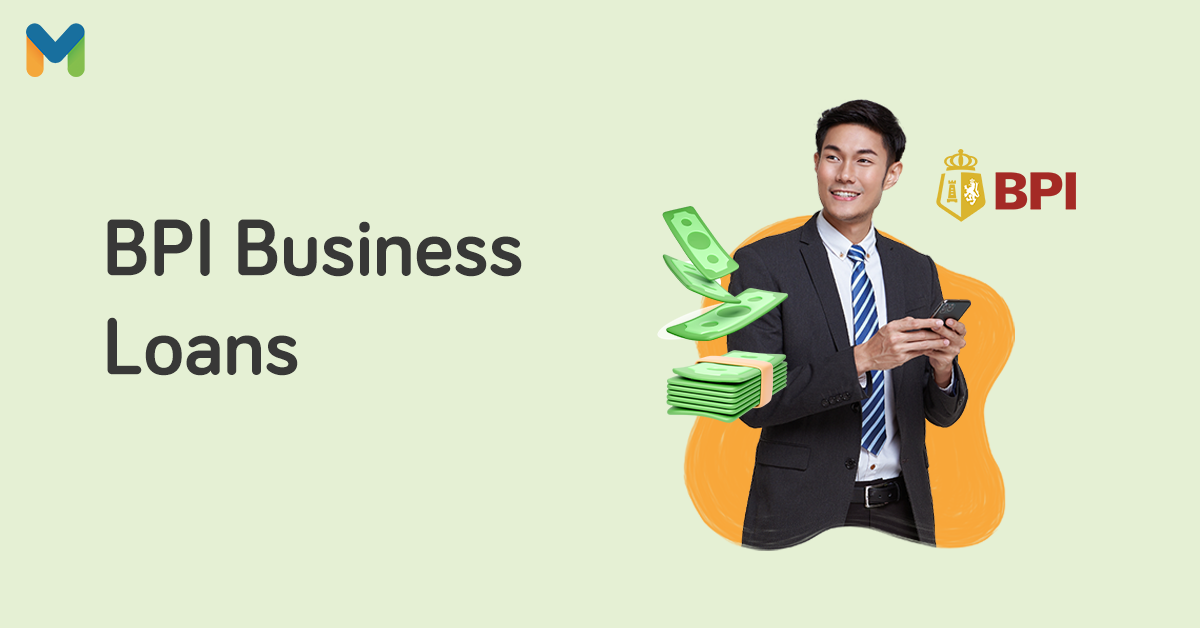Finding good sources of funding is a critical step in starting a business. A small business loan in the Philippines from the government, a bank, or a private lender is a viable financing option for budding business owners.
However, three in four or 77% of 100 Filipino micro, small and medium-sized enterprises (MSMEs) surveyed by the cloud banking platform Mambu[1] are unable to secure sufficient business funding. Of these businesses that lack funding, 48% went on to have cash flow issues, and 48% failed to launch new products.
To avoid common startup problems, secure a loan for a startup business in the Philippines instead of using up your savings or borrowing money from family and friends.
Below are the basics of a startup business loan and the different types of loans for every business. In this guide, you'll find different government and bank loan options for a startup or small business.
What is a Business Loan?
Startups need funding or capital to begin their operations and start earning profit. Banks and financial institutions lend this money in advance to businesses through a business loan. In turn, lenders collect payments with interests based on the agreed-upon payment schedule and lending agreement.
A startup business loan in the Philippines is a financing opportunity in which lenders provide funds to borrowers who will start a business, expand it, or pay off debts and other expenses. For whatever purpose they may serve, business loans are a relief to entrepreneurs who need extra funding for their operations.
What is the Difference Between a Business Loan, Consumer Loan, and Personal Loan?
-Jan-20-2023-08-02-39-9006-AM.png?width=675&height=450&name=Pics%20for%20blog%20-%20600x400%20(2)-Jan-20-2023-08-02-39-9006-AM.png)
The purpose of a business loan is to fund a business's needs. It may be used for business expansion or operating expenses.
A business loan typically offers higher loanable amounts and has more documentary requirements because of the considerable funding required to set up a business.
On the other hand, a consumer loan is a general type of loan. Personal, housing, and auto loans are examples of consumer loans. You can apply for any of these consumer loans to purchase items or services for personal consumption or refinance debts.
When it comes to interest rates, personal loan interest rates are usually higher compared to business loan interest rates. This is because personal loans are considered riskier for lenders.
Business loans have a longer and more thorough application process and stricter eligibility requirements. Because of this, lenders have more confidence that business loan borrowers can pay off the entire loan—hence the lower interest and longer repayment period.
How Do I Qualify for Business Loans in the Philippines?
Banks and financial institutions have different eligibility criteria. However, here are the most common business loan requirements:
- Must be a Filipino citizen aged 21 but not older than 65 when the business loan matures
- Should have an SEC-registered or DTI-registered business with at least three years of profitable business operations
- Must meet a minimum annual gross sales
- Good credit standing
Basic Business Loan Requirements
Prepare the following documents when applying for a loan to start a business in the Philippines:
- Valid government-issued ID (Passport, Driver's License, TIN ID, PRC ID, Postal ID, or UMID)
- Proof of business billing address (Business Permit, Lease Contract, Utility Bills)
- DTI or SEC Certificate
- BIR Certificate of Registration
- Photocopy of audited financial statements
- Business background/company profile
- Accomplished loan application form
What are the Four Types of Startup Business Loans in the Philippines?
A business loan in the Philippines comes in various types that suit different business requirements. Before you start searching for the right startup business loan, it helps to know the types of business loans for beginners. By doing so, you can understand your options better and easily find the loan that matches your needs.
👉 Term Loans
-Jan-20-2023-08-07-01-4936-AM.png?width=674&height=449&name=Pics%20for%20blog%20-%20600x400%20(3)-Jan-20-2023-08-07-01-4936-AM.png)
What is a Term Loan?
A term loan allows entrepreneurs to meet their short-term or long-term business funding needs while keeping their funds intact. It’s a great small business loan option in the Philippines for startup owners who want to make their loan repayments more manageable by spreading them out in regular installments.
Is a Term Loan Right for My Business?
Term loans are ideal for short-term or long-term funding for the following purposes:
- New equipment for increasing production or expanding a business
- Construction, renovation, or purchase of office space, store, warehouse, and other properties
- Adding fixed working capital to a business
- Loan for a franchise business
Loan Amount
Lenders provide term loan amounts ranging from ₱100,000 to ₱20 million.
Method of Funding
Borrowers receive the full loan amount as a lump sum credited to their deposit account.
Loan Term
Short-term loans are payable within a year, while long-term loans can be paid for up to five to 15 years, depending on the lender.
Repayment Mode
Most term loans for businesses are paid back in fixed or equal monthly payments that include both the principal and interest.
Term Loan Options for Startups in the Philippines
| Loan Name | Loan Amount | Loan Term | Interest Rate |
|---|---|---|---|
| BPI SME Term Loan | Minimum of ₱300,000 | Up to 5 years | Prevailing market interest rates |
| Metrobank SME Term Loan | ₱1 million-₱20 million |
|
“At competitive interest rates” |
| OWWA Loan (for OFWs) |
|
|
7.5% fixed for the entire loan duration |
| PSBank SME Term Loan with Prime Rebate |
|
Up to 7 years | Prevailing PSBank rate at the time of loan availment |
| Security Bank SME Business Mortgage Loan | Up to ₱30 million | Up to 20 years (depending on Security Bank's valuation) | 9.50% - 11.25% (depending on loan amount and fixing period) |
| SSS Business Development Loan Facility | The lowest of the following:
|
Up to 15 years | Prevailing SSS rates |
| SSS ASENSO | Maximum of ₱5 million |
|
Prevailing SSS rates |
| Robinsons Bank Go! Small Biz |
|
1-10years | Prevailing Robinsons Bank rates |
| LANDBANK Term Loan Facility for General/Small & Medium Enterprises | Inquire at the nearest LANDBANK Lending Center nationwide or call customer service hotline at (02) 8-405-7000 or at PLDT Domestic Toll Free 1-800-10-405-7000. | Contact LANDBANK for info. | Contact LANDBANK for info. |
| Maybank Retail SME Loan | ₱500,000-₱50 million | Up to 20 years | Prevailing market rates |
| PNB Term Loan | Inquire at the nearest PNB branch nationwide or call the customer service hotline at (+632) 8573 8888. |
|
Contact PNB for info. |
| PNB Small Business Loan Program |
₱1 million-₱10 million | 1-5 years | Contact PNB for info. |
| UnaCash Supply Chain Financing |
₱100,000-₱5 million | 6 months, renewable | Varies on credit profiling result |
| CTBC Term Loan ₱500,000-₱70 million |
₱500,000-₱70 million |
|
Prevailing CTBC SME Business Loan rates |
| PBCom Puhunan Plus |
₱10,000-₱150,000 | 14 to 84 days | 2.5% - 5% |
| PBCom Working Capital Loan |
Inquire at the nearest PBCom branch nationwide or call the customer service hotline at (+632) 8777-2266. | Contact PBCom for info. | Contact PBCom for info. |
| HSBC Term Loan |
Inquire at the nearest HSBC branch. | Contact HSBC for info. | Contact HSBC for info. |
DTI also offers loans for start-up businesses in the Philippines.
👉 Credit Line

What is a Credit Line?
A credit line is a short-term loan that provides quick access to money on demand. It allows greater financial control, as the interest accumulates only when you purchase against the credit line. You pay the interest just on the amount that has been used.
Also known as an evergreen loan,[2] a credit line or a line of credit allows you to repeatedly access funds without applying again and again. An evergreen loan lets you pull out money from your fund, make payments, and then pull out some money again.
Is a Credit Line Right for My Business?
A credit line is ideal for short-term, recurring, or working capital financing for the following purposes:
- Purchase of additional supplies, inventory, or both to meet seasonal demand
- Increasing working capital for financing daily business operations
- Accounts receivable financing
- Contract financing[3]
Loan Amount
Small and medium business owners can borrow from ₱500,000 to ₱20 million against a line of credit.
Method of Funding
For credit lines, lenders fund the borrowers' business checking account with the approved loan amount, giving them access to funds through issuing or encashing checks.
Loan Term
Credit lines are valid for one year and can be renewed annually upon the lender's approval.
Repayment Mode
Paying off a credit line is more flexible than that of a term loan. While the interest is paid in monthly installments, borrowers can repay the principal anytime or as often as they can within the loan term. It makes managing cash flow a lot easier for business owners.
Credit Line Options for Startups in the Philippines
| Loan Name | Loan Amount | Loan Term | Interest Rate |
|---|---|---|---|
| BPI SME Credit Line | Minimum of ₱300,000 | 1 year, renewable | Prevailing market interest rates |
| Metrobank SME Credit Line | ₱1 million-₱20 million | 1 year, renewable yearly (subject to the bank's approval) | “At competitive interest rates” |
| PSBank SME Business Credit Line |
|
1 year, renewable yearly | "At competitive SME Business Credit Line rates" |
| First Circle Revolving Credit Line | Up to ₱5 million | Up to 6 months | Starts at 1.39% |
| Robinsons Bank Go! Small Biz | ₱500,000-₱20 million | 1-year credit line | Prevailing Robinsons Bank rates |
| Maybank Retail SME Loan | ₱500,000-₱50 million | Up to 90 days PN term | Prevailing market rates |
| PNB Revolving Credit Line |
Inquire at the nearest PNB branch nationwide or call the customer service hotline at (+632) 8573 8888. | Up to 365 days PN term | Contact PNB for info |
| CBS SmallBiz Revolving Promissory Note Line |
Up to ₱10 million | Contact CBS for info. | Contact CBS for info. |
👉 Secured Business Loans

What is a Secured Business Loan?
A secured loan for business requires collateral—such as real estate properties and bank deposits—that the lender will claim to recover its losses in case the borrower defaults on the loan.
The collateral reduces the risk for lenders, which is why secured loans generally have some of the lowest interest rates for business loans in the Philippines. It also offers longer loan terms and higher loan amounts than unsecured loans.
These features make a secured business loan affordable and suitable for startup businesses, especially since they're just beginning to make profits.
For secured business loans, lenders charge collateral-related fees such as appraisal and collateral registration fees. With the exception of a few, term loans and credit lines in the Philippines have secured business loans.
Secured Business Loan Options in the Philippines
| Secured Business Loan | Collateral |
|---|---|
| BPI SME Term Loan and SME Credit Line | Real estate mortgage, deposit, or investment |
| Metrobank SME Business Loans | Real estate mortgage; Bank deposit or placement |
| OWWA Loan (for OFWs) | Real estate property or any loan security accepted by the bank |
| PSBank SME Loans | Residential, commercial, or industrial property; Cash deposits |
| Security Bank SME Business Mortgage Loan | Residential, commercial, or mixed-use property; Hold-out deposit |
| SSS Business Development Loan Facility / SSS ASENSO | Any collateral accepted by the SSS and partner bank |
| Tonik Big Loan | Real estate property (condo) |
| Bank of Commerce Small Business Loan | Residential, commercial, or industrial property; Cash deposits |
| CBS SmallBiz Term Loan | Real estate mortgage / deposit |
👉 Unsecured Business Loans

What is an Unsecured Business Loan?
Unlike secured loans, an unsecured business loan can be acquired without collateral by startup businesses in the Philippines. They're more challenging to qualify for, especially for those with bad or no credit history.
No-collateral business loans also come with higher interest rates, shorter loan terms, and lower loan amounts than loans secured by collateral.
Private lenders typically provide unsecured business loans in the Philippines, while only a few major banks have this type of business loan. The big banks tend to focus on collateralized loans. It can be quite difficult to get approved for an unsecured business loan with a decent interest rate.
Consider reputable private businesses such as First Circle, Esquire Financing, or Acudeen. While they have yet to reach the brand recognition of major banks, their processing time is often a lot quicker. And depending on your company's credit profile, their interest rates are sometimes even cheaper.
Here are some startup business loans without collateral in the Philippines:
Unsecured Business Loan Options in the Philippines
| Unsecured Business Loan | Loan Amount | Loan Term | Interest Rate |
| BPI and DTI collateral-free term loans | Contact BPI for the loan information (Call 02 7918-2000 or email bbclientservices@bpi.com.ph) | Contact BPI for info | Contact BPI for info |
| Security Bank SME Business Express Loan | ₱500,000–₱5 million | 12, 18, 24, or 36 months | Monthly add-on rates of 1.30% to 1.75% depending on the loan term |
| DTI Pondo sa Pagbabago at Pag-Asenso (P3) Program | ₱5,000-₱200,000 | Call the SB Corp. hotline (02) 8651-3333 for more details. | 2.5% monthly interest |
| Esquire Financing Inc. | Up to ₱10 million | Contact Esquire at (02) 8811-8888 for more details. | Contact Esquire for info. |
| Zenith Capital SME Loan | ₱500,000-₱20 million | Up to 12 months | Contact Zenith Capital at (02) 8636-5458. |
| Welcome Bank Business Loan | ₱50,000-₱3 million | Up to 3 years | Starts at 1.39% |
| UnionBank Business Loan | ₱50,000-₱1 million | Up to 3 years | 3% monthly interest |
| Blend PH Business Loan | ₱500,000-₱2 million | Up to 3 years | Depends on credit standing |
💼 Launch or Expand Your Small Business With a UnionBank Personal Loan
Ready to start or grow your small business? If you're planning to secure funds to buy inventory, pay for a bigger space, or hire employees, check out what UnionBank has to offer. Borrow funds up to ₱2 million and get your loan disbursed in as fast as 24 hours.
7 Considerations When Choosing a Startup Business Loan in the Philippines
Which business loan in the Philippines best fits your financing needs? Consider these seven important factors first.
✔️ Your Purpose for Borrowing Money
What do you need the money for? Is it for a short-term need like buying inventory and supplies to meet seasonal demand? Or are you looking to fund a long-term investment like building your shop?
The different types of business loans in the Philippines cater to their own specific purpose, be it short-term, long-term, or both. Be clear about your goals from the get-go. Before applying for a business loan in the Philippines, decide what you will use the funds for.
Expand the Business
A business expansion reflects an entrepreneur’s vision to grow. Banks are more likely to approve most loan applications for purchasing land, a working space, or any form of real estate to accommodate a growing operation.
If you think your business is on track for growth, you can apply for any available business loans. Just remember that most lenders require your assets as collateral for the loan.
Purchase Equipment
Some business owners borrow money to upgrade or add equipment. Compared to a business expansion, you’ll need a smaller loan amount for equipment purchases. However, you still need to make a cost-benefit analysis[4] to determine whether it’s more practical to buy a new tool or lease it long-term.
Increase Working Capital
A term loan is usually one of the best options if you’re looking at increasing your money for day-to-day operations. Some business owners apply for a loan to start a business until their profits and sales reach a specific volume.
Take note that business loans for working capital are considered riskier than loans for business expansion. Depending on your negotiation with the lender, this may result in higher interest charges.
Improve Marketing Strategy
Marketing strategies can make or break a business, and entrepreneurs need to adopt new techniques to improve their visibility and credibility among potential customers. Take out a business loan in the Philippines to invest in employee training, software, new staff, and technology.
✔️ Loan Amount
Next, determine how much you need to borrow for your business. Loanable amounts vary according to the type of loan and the lender.
For example, secured business loans for startups typically have higher loan amounts than unsecured loans. The higher the value of your collateral, the better your chances of qualifying for a higher loan amount. Also, compared to government agencies and private lenders in the Philippines, most banks lend more to entrepreneurs.
Determining your loan amount is crucial because this comes with interest and repayment depending on the sales and revenues of your business. Before deciding on the final loan amount, check your balance sheets to know how many monthly amortizations your business can cover.
✔️ Method of Funding

How do you prefer to access your funds? Do you want to receive the loan proceeds as a one-time lump-sum amount? Or would you rather access the money only when you need it? Business loan types differ in how the loan proceeds are released to the borrower.
✔️ Loan Term
How long can you realistically pay the business loan? Can you pay it off within a year? Or do you need a longer time to complete your loan repayments?
The loan tenor can either shorten or prolong your agony of making monthly repayments. Again, deciding to pay it off in a year or 10 depends on the status of your business.
Short-Term Loans vs Long-Term Loans Comparison
| Features | Short-Term Loans | Long-Term Loans |
|---|---|---|
| Repayment | 1 year | Up to 10 years |
| Eligibility requirements | Basic loan requirements to be fulfilled by the borrower | Most qualified buyers are more eligible for long-term loans because lenders are faced with higher risks when extending loans for a longer period |
| Loan amount | Smaller amount since the loan is payable for a shorter period | Bigger loan amounts are offered to long-term borrowers depending on the lenders' loan cap for their bank products |
| Interest rates | Higher and less flexible interest rates | Flexible and lower interest rates |
| Monthly amortization | Higher monthly amortization | Lower monthly amortization since the loan amount is stretched within a longer period |
✔️ Repayment Mode
What mode of loan payment will work better for you: fixed or flexible monthly payments? The right choice depends on the cash flow of your business.
Fixed-Rate Loans vs Variable-Rate Loans
| Features | Fixed-Rate Loans | Variable- Rate Loans |
|---|---|---|
| Interest rates | Same interest rates for the entire loan duration | Vary for the entire loan term depending on the benchmark interest rate that changes periodically |
| Payments | Same amortization all throughout the loan duration | May change depending on the prevailing interest rate |
| Impact | The borrower will not benefit from a declining interest market | The borrower will have to pay more if the interest market increases |
| Suitable for | Both short-term and long-term borrowers who want predictable monthly loan payments | Short-term borrowers who want to take the opportunity of paying less when the market declines |
✔️ Collateral
Do you have a valuable asset you’re willing to put up as collateral for a secured business loan? If so, the amount you can borrow will depend on the appraised value of your collateral. Borrowing money through secured loans using your properties and assets as collateral has its pros and cons:
Advantages of Borrowing Money with Collateral
- Increases your chances of approval - A collateral improves your eligibility for the best business loan in the Philippines. If you have a low credit score or haven’t borrowed before, the collateral is enough to guarantee your loan repayment.
- Gives you a chance to explore more lenders - With an on-hand asset to offer, you can apply to the best bank for a business loan in the Philippines. If you don’t have collateral, you might have to settle for the lender that approves your credentials even if the interest rates are high and the loan terms are not convenient.
- You can get lower interest rates - A piece of property reduces the loan risk for the lender. Thus, the lender might reduce the loan's interest rates.
Disadvantages of Borrowing Money without Collateral
- Your options are limited - Again, without an asset to guarantee a loan, you might settle with lenders that approve your loan application even when the loan terms are not easy.
- The interest rates are potentially high - Unsecured loans usually come with hefty charges and high interest rates because there’s no guarantee that the loan can be paid off.
- The loan amount can be low - Most of the time, the maximum loan amount is up to 80% of the property value. Those looking for unsecured personal loans for startups in the Philippines might get lower loan amounts because of the higher risk.
✔️ Interest Rate
Of course, you want to get the best business loan at the lowest rate possible. But it can be tricky because interest rates vary according to the lender's prevailing rate, loan term, and type of loan. For instance, lenders charge higher interest rates on unsecured business loans than on secured ones.
Knowing the difference between effective interest rates and APR will give you a visible benchmark when comparing loans. Lenders usually just advertise a loan's interest rate but may not reveal the APR, which is the actual cost of the loan that includes everything charged to you.
Here’s a quick comparison if you want to get an idea of business loan interest rates in the Philippines for 2023:
Effective Interest Rates vs Annual Percentage Rates
| Features | Effective Interest Rate | Annual Percentage Rate |
|---|---|---|
| What it is | The cost of the loan | The cost of the loan and all other fees included with the loan |
| Factors to determine the rate | Borrower's credit score, debt-to-income ratio, and income stream | Interest rates, fees, penalties, and other factors that may either decrease or increase the loan cost |
Final Thoughts
After you've considered all factors when choosing a startup business loan, take a look at each type of loan. As an entrepreneur launching a startup in the Philippines, you have four choices: term loans vs. credit lines and secured vs. unsecured loans. Use this guide to find the best business loan for you.
Money is a serious matter when running a business of any size, startups included. Do your research to determine the suitable type of business loan for starting your business and funding your business needs. Spare yourself the trouble by using a free online comparison tool that can help speed up your search for the right loan to fund your business.
Compare Other Loan Options for Starting a Business in the Philippines
Below is a list of trusted personal loan companies and their loan features. Compare your options and apply through Moneymax!
|
Provider
|
Loan Amount
|
Monthly Add-on Rate
|
Loan Term
|
Minimum Annual Income
|
Approval Time
|
|---|---|---|---|---|---|
|
UnionBank Personal Loan
|
Up to ₱2 million
|
26.9% per annum
|
12 to 60 months
|
₱250,000
|
As fast as 5 minutes
|
|
UNO Digital Bank Personal Loan
.png?width=149&height=52&name=Unobank-Logo-Colored_Horizontal-Medium%20(for%20MMX).png) |
₱10,000 to ₱500,000
|
1.79% per month (corresponds to annual contractual rates or annual percentage rates ranging from 35.78% to 37.54%)
|
Six to 36 months
|
₱240,000
|
Five to seven banking days
|
|
Metrobank Personal Loan
|
₱20,000 to ₱2 million
|
1.25% to 1.75%
|
36 months
|
₱350,000
|
Seven banking days
|
|
BPI Personal Loan
 |
₱20,000 to ₱3 million
|
Maximum annual contractual rate of 28.67%
|
12 to 36 months
|
Inquire with BPI
|
Five to seven banking days
|
|
Tonik Credit Builder
 |
₱5,000 to ₱20,000
|
4.84%
|
Six to 12 months
|
Inquire with Tonik
|
Two banking days
|
|
Tala

|
₱1,000 to ₱25,000
|
0.43% daily
|
Up to 61 days
|
None
|
Five minutes to 24 hours
|
|
HSBC Personal Loan
|
₱30,000 to ₱500,000
|
0.65%
|
Six to 36 months
|
₱168,000
|
Five to seven banking days
|
|
CIMB Personal Loan
|
₱30,000 to ₱1 million
|
As low as 0.83%
|
12 to 60 months
|
₱180,000
|
One to two banking days
|
|
Maybank Personal Loan
|
Up to ₱1 million
|
1.3%
|
Up to 36 months
|
₱300,000
|
Inquire with Maybank
|
|
RCBC Bank Personal Loan
 |
₱50,000 to ₱1 million
|
1.3%
|
Six to 36 months
|
₱360,000
|
5 to 7 banking days
|
|
PSBank Personal Loan
 |
₱20,000 to ₱250,000
|
|
24 or 36 months
|
₱180,000
|
Five to nine banking days
|
Sources:
- [1] Filipino MSMEs turn to friends and family amid business funding roadblocks (BusinessWorld, 2022)
- [2] Evergreen Loan Definition (Investopedia, 2021)
- [3] Can Contract Financing Work for Your Small Business? (Kassar, 2014)
- [4] Selecting a loan and doing a cost benefit analysis (Loan Market)







_1200x350_CTA.png?width=734&height=214&name=UB_PL_Generic_Ad_-_Business_Expansion_(Sep_2023)_1200x350_CTA.png)


